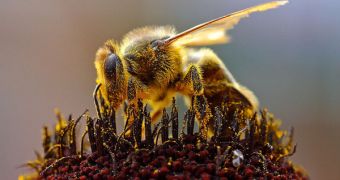The serious situation of bees in the UK has recently prompted British Beekeepers Association (BBKA) members to demand some $8 million in government funding, to avert the ever-increasing incidence of the Colony Collapse Disorder (CCD), which threatens all bees in the country. Francis Ratnieks, a scientists and the only apiculture professor in the United Kingdom, took it upon himself to aid the insects, by manipulating the genes of worker bees.
Actually, the researcher is trying to create cleaner bees, as in, a hive doctor of sorts. The cleaner bees were first observed in the 1930s, and they are very rare in hives, with approximately 10 percent of which having bees with the "cleaner" gene. Basically, these bees are responsible for cleaning the hives, in that they rid the colony of larvae and pupae that are dead or about to die, so as to avoid infections.
Also, these bees eliminate mites, such as the varroa mite, which is believed to have killed some 2 billion honeybees last year alone. Some 30 percent of all hives destroyed over the past 12 months were also caused by this mite, which can be successfully tackled by the cleaner bees. Of course, there are also other types of mites, just as dangerous, which pose considerable risks to colonies.
By multiplying the number of cleaners, and artificially introducing them into colonies, Ratnieks hopes to be able to stave off the decline in bee numbers. His researches are being funded by large honey manufacturer Rowse Honey, as well as by the Bee Farmers' Association, which helped the scientist test his theories in some 100 hives throughout the country.
Implanting all colonies with cleaner bees will be a daunting task. The level of micromanagement required for this operation to succeed will be enormous. But with $54 million lost in Britain last year, due to bee deaths, and with some $165 million at risk in the coming years, it's likely that the Department for Environment will also step in and aid the research.

 14 DAY TRIAL //
14 DAY TRIAL //